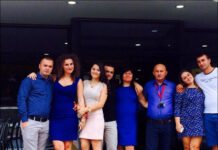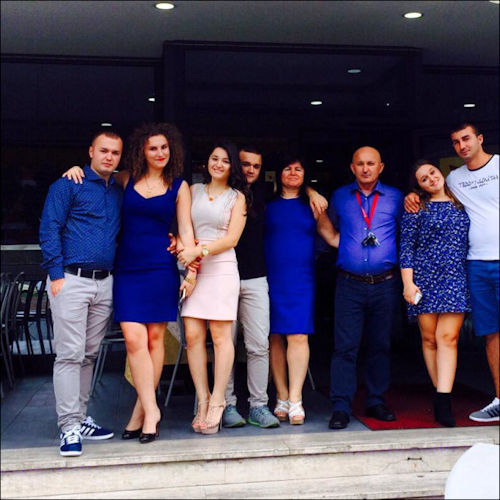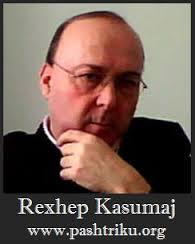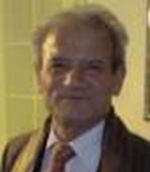Written by: Tome Mrijaj
4 January 2011, New York
On Tuesday, 4 January 2011, at the North Shore Hospital of Forest Hills, Queens, New York, the 97-year old Kapidan of Mirdita, Ndue Gjomarku surrounded by his family; brother Kapidan Nikolle Gjomarku, son Gjon and daughters, Maria Cristina, Bianca(Bardha), and Alessandra peacefully passed away. Also present, was the Very Reverend Father Pjeter Popaj with close family friends Dr. Gjon Bucaj, President of the Pan-Albanian Federation “VATRA” as well as Secretary of Bloku Indipendent [Independent Bloc], Tome Mrijaj, General Secretary of the League of Prizren, and others.
Who was Kapidan Ndue Gjomarku?
In Orosh, Mirdita, 97 years ago, on 29 September 1914, the birth of Ndue Gjonmarku would add joy to the proud parents, Kapidan Gjoni and Mrika, as well as the first born son, older brother Marku. This large noble family of Orosh would be blessed with 10 children: Five sons; Mark, Ndue, Llesh (Aleksander), Deda, and Nikolla, and five daughters; Dava, Gjela, Marta, Dila, and Bardha.
Besides being a son of the famed Kapiden of Mirdita, Ndue Gjon Marku was also the nephew of the Bajraktar [hereditary chief] of Kurbin, Gjok Pjeter Pervizi. Thus, mother Mrika’s family was well-known for their courage (besa), and the Albanian traditional customs of the past and present which they espoused.
Kapidan Gjon assured that all of his sons would attend primary school. Among them would also be Ndue Gjomarku who completed his primary and secondary education under Franciscan and Jesuit Catholic schools in the ancient city of Shkoder in 1934. At that time, the Minister of Education of the government of King Zog was Dr. Mirash Ivanaj.
An inclination after the world of western culture and books, the adolescent Ndue in 1937, together with his brother Llesh, leaves Albania for the University of Vienna. After several years of studying in Austria, Ndue returns to Albania and within a couple of month’s leaves for Italy. There he enrolls in the University of Florence where he continues his studies in jurisprudence. Although Ndue is far from home, he never severed his ties with his beloved homeland. As his old friends liked and respected him, so do the new ones he makes. This, however, is not uncommon especially for the Household of the Kapidan of Mirdita who always respected the people of Mirdita and the inhabitants of the other Albanian regions.
In 1943, the young Gjomarku returns to Albania. His experience as a student along with his new and old friends broadened his circle of acquaintance. This is verified by some of his contemporaries who still reside in Shkoder and in Orosh who testify that the Gjomarku family, and Ndue himself verifies that they had the honor, fate, privilege, and pleasure to attend many events; patriotic, religious, and cultural in the distinguished city of Shkoder and other significant cities where they conversed with nobles, city officials, hierarchy of the Catholic clergy, foreign consuls and travelers who often visited Albania and especially the northern region.
During a conversation with Kapidan Ndue, I asked, “What would be an experience in your lifetime that has stayed deep within your memory?” With a noble smile he answered:
“I was relatively young, around 16-17 years old, when in Shkoder the Catholic clergy were making preparation for the ordination of the newly named Bishop of Shkoder and Primate of the Catholic Church in Albanian, Monsignor Gasper Thaci (1882-1946). The nobles of Shkoder arrived at our home and requested that I lead the civil dignitaries for this very serious ceremony for the city of Shkoder and its devout Catholic faithful. I replied that father is presently in Mirdita. They responded by saying, that ‘You can represent your father Kapidan Gjon and the Principality of Mirdita.’ I, with much pleasure, attended the elevation of the new Bishop with the other nobles of the city along with many heads of the most renowned families of Shkoder, like the Coba, Muzhani, Pistulli, and others. I was also asked to sit at the head of the table of honor between two foreign consuls: Italian and Yugoslavian. I was too young to be among such company; however, I passed my first test well. This I credit to my upbringing in the Kulla [tower/castle] of Orosh where we were taught to listen and not talk…”
Even the well known Albanian-American scholar of the Diaspora, Idriz Lamaj, in his notes on the biography of Kapidan Nude Gjon Marku writes, “Ndue had the opportunity to greet and escort many distinguished Albanian and foreign personalities as he represented his famous Household … But according to him, it was my daily contact with the people and chiefs of Mirdita, and other regions, that formed my traditional and canon viewpoint. All of these contacts shaped him morally and politically to comprehend the reality of the complicated situation of the times.” (Idriz Lamaj, Komiteti Kombetar “Shqiperia e Lire” 1949-1956,” New York, USA, 200, fq.101).
After much conversation, I asked with interest Kapidan Ndue, “How he spent his time at those unexplored mountains of Mirdita?” As usual, he responded with a noble smile saying, “For me, Mirdita is the most beautiful and loved place in the entire world. The noble people of the region of Mirdita loved and respected us very much. We never waited for the people to greet us, but we greeted them regardless if they were younger or older than us. We had great relations with the people and we actually were like a big family. As a result, that is why Oroshi and its regions of Mirdita is everything to me and to our household.”
Kapidan Ndue Gjomarku was the alpha and the omega in the war against the Communists.
During that time period, all the regions of northern Albania and their diplomatic and social circles knew and valued the esteemed figures of Kapidan Gjon Marka Gjoni and his eldest son, Dr. Mark Gjomarku (Minister of the Interior), and Llesh Gjomarku, who were very politically active. On the other hand, Ndue, as he states was more content in private life of the family.
As father and son, both sensed the coming of the raging communist tempest that had caused such havoc in Eastern Europe, and especially in Russia. They began preparation in confronting communism by awakening the national conscience of the Albanian nationalist forces. Communism was an atheist ideology of destruction without a homeland, while the nationalists were natives living on their ancestral lands who felt duty bound to protect their territory as they did generations after generations. This time period demanded more than ever that the sons of the eagle demonstrate their patriotism as they safeguard the values handed down to them by their forebears; Albanian dignity, religious freedom, pluralism of thoughts, economic prosperity, and the spiritual, economic, and political relations established with Western Europe.
As a means of consolidating politics, Kapidan Gjon, in the spring (March) of 1944 founded “Grupit Nacional Indipendent” [National Independent Group], while his son, Dr. Marku found support for his initiative in forming “Lidhjen e Shkodres” [League of Shkodra] by gathering around him leading anticommunist exponents that were aligned with the well-known Albanian nationalists organizations, “Legaliteti” [Legality],”Ball Kombetar” [National Front], and “Grupi Nacional Indipendent” [National Independent Group].
It was not by chance, but due to the patriotic interests of Albania that Ndue at once embraced politics once he found out that the so-called partisan forces were approaching near his much beloved birthplace – Mirdita. He informed his brother, Marku, in Tirana that the province of Mirdita and all of North Albania are under attack from the Red Beast [Communists], which unfortunately consisted of Albanians by names and blood. Among other things, Ndue requested that a clarion-call be released to establish a resistance from determined anticommunist volunteers. Immediately he receives an encouraging and positive response from his brother, Dr. Marku, who was much concerned about the fragile fate of Mirdita. According to Kapidan Ndue Gjon Marku and as written by the scholar Idriz Lamaj, Dr. Marku wrote, “Dearest Ndue, today begins a new twist in the history of our household, in Mirdita and all of Albania. Bring together as many volunteers and begin the resistance against the Communist brigades. We have no other alternative.” (Lidriz Lamaj, Ibid, 102).
While Ndue was organizing the political and military forces of the Albanian nationalists this gave him the opportunity to meet with the upper echelon of the Albanian nationalists groups such as Legaliteti and Ballit Kombetar. Whom although suffered loses during their skirmishes against the communists never surrendered.
These Albanian nationalist forces had reached Northern Albania. Among them, was the patriot Mit’hat Frasher, known as the Servant of Ethnic Albania (the son of the patriot of the Albanian Renaissance Abdyl Frasheri) the principle leader of Balli Kombetar. Abaz Kupi of Legaliteti had also arrived at the house of Gjon Fushes in Bulger, Mirdita. Mit’hat Frasher accompanied by his fighters remained in Mirdita and left for St. Paul where Ndue Gjomarku awaited them. They spent the night there and the following morning Ndue, with his most trusted men, escorted them to Shkoder. It is imperative to state, that Kapidan Ndue always had a particular respect for the flaming patriot Mit’hat Frasheri. His admiration for Frasheri’s patriotic and intellectual endeavors would lead Ndue to say, “He was a man with great national prestige, who descended from a family of great patriotic merits.” Ndue would have further encounters and fruitful joint cooperation with other nationalist leaders in the war against the communist in Albania, Western Europe, and the United States.
The events during this period developed with extreme acceleration. As always, however, the brain and head of the anticommunist movement remained in Northern Albania with its headquarters in Mirdita. On 26 November 1944, Dr. Mark Gjomarku, with his entire forces undiscouraged they decided to leave Shkoder and headed towards the mountains of North Albania. During this time, Ndue and his fighters fought for five months in the rain and snow without being overcome by the partisan brigades of Mehmet Shehu, who was under the direct command of Enver Hoxha.
The forces of the communist brigades that conquered the regions of Luma and Lura were large in numbers and well armed as they continued marching near the region of Mirdita. The Albanian nationalists forces under the command of Ndue Gjomarku found themselves in a precarious situation, as they were completed encircled. The communists attacked them from three directions simultaneously without giving them the opportunity to better organize their defensive stand. Thus, according to Ndue, the only option was to secure a stronghold of resistance at St. Paul. As a result, fierce fighting between the communists and the Albanian nationalists began. The former seeking to conquer the proud and glorious history of Mirdita through brutal force, while the latter only wanting to defend the democratic values and freedom of the populace from enslavement by the internationalist proletariat who wanted a world without God. This was the “Black Night” that engulfed all Albania on November 29,1944.
Dispite the great resistance for three consecutive days against the communists, Ndue seeing the huge losses among the Albanian nationalist forces ordered a retreat for Shkoder – one of the major anti-communist strongholds. In Shkoder, Kapidan Gjoni, Dr. Marku and Ndue met to discuss in detail the new plan of action advised by Dr. Marku. He was determined to persuade his father and brother, Gjon Marka Gjoni and Ndue, that they evacuate Albania so that the Kapidan Household would not become extinct due to the inevitable continual military clashes with the communists. Although a very painful reality for the entire Gjomarku family, it was the only viable solution carefully thought out by Dr. Marku. Decades later, the memory of this painful event was still fresh to Kapidan Ndue Gjomarku as he discusses that moment of separation from his much beloved brother and other family members. It was precisely in Malesia e Madhe [The Great Highlands] at the Catholic Church of Kastrat, where Ndue would embrace his brother, Dr. Marku, for the last time.
Immediately afterwards, father and son leave Kastrat as they go to Tuz, Kolasin, Visegrad, Sarajevo, Zagreb, Vienna, Linz and Innsbruck during the harsh winter months and under frequent Allied bombings. Once in Innsbruck, they rested there for several days and then by car were driven to Italy as they passed the “Passo di Resi” near the Swiss border. They stayed in Merano for five months and in August of 1945 headed for Rome, which was their final destination.
As soon as Kapidan Ndue reached the West (Italy), he contemplated on uniting the Albanian nationalists and anticommunist forces and thus launches the foundation for the creation of a new and reliable political organization that would counter the red regime [communist] of Tirana, which was plunging the people into sheer misery. The fruit of these endeavors was the founding of political party called, “Bloku Kombetar Indipendent” [The National Independent Bloc] in 1946. Bloku Kombetar Indipendent enjoyed longevity as it continued to function with dignity, honor, and decency until the toppling of the communism in Albanian on 13 December 1990.
During 1948, in cooperation with the Anglo-American allies, Kapidan Ndue is given the opportunity to send volunteers to overthrow the communist government in Albania. In this manner Komitetin Kombetar “Shqipnia e Lire,” [The National Committee “Free Albania”] was founded, where many members of Bloku participated in /or where many of its members were from Bloku.
In connection with the Komitetin Kombetar “Shqipnia e Lire” mission, Kapidan Ndue recalls, “Morally we were proud of being part of the war against the communist regime. We decided to send two loyal fighters who without any opposition accepted the mission. This is how the undertaking against the communist regime of Albania began.”
Bloku took the first initiatives to safeguard the good-will endeavors for uniting all the Albanian anticommunist forces in exile, which were split into two; members of the Komitetin Kombetar “Shqipnia e Lire” and non-members. The main purpose of this initiative was to bring these factions together and thus create a united front with a clearer and more harmonized agenda against the communism, which would ultimately better serve the needs of the fatherland. However, the path towards cooperation became more difficult as polemics became obstacles to the initiators from Mirdita.
The efforts of Kapidan Ndue Gjomarku encountered an impediment when the representatives of Balli Kombetar, who at the time controlled all the leadership positions in Komitetin Kombetar “Shqipnia e Lire”, refused to accept him. Thanks to the western cultural mentality with their far-sighted political vision for the future of Albanian, the Anglo-American representatives took into consideration the noble family history of the Kapidan of Mirdita along with the direct military contribution in the war against the communist and therefore intervened on behalf of Kapidan Ndue. After energetic diplomacy, a solution was reached with the Kapidan of Mirdita becoming one of the organizations main leaders.
Kapidan Ndue would have important meetings in Italy with high ranking military personnel; Admiral to the Italian Navy, Mr. Talarigo, representatives of the Anglo-American mission, and representatives of the Foreign Ministry of Italy. He also had other meetings with well-known British figures who personally participated in the Albanian Questions, such as diplomat and writer, Aubrey Herbert and British military officer, Billy McNeal. During these meetings, Kapidan Ndue would maintain that Komitetin Kombetar “Shqipnia e Lire” should without a doubt embrace well-known intellectuals like Xhafer Deva, especially since he was one of the must influential figures in Kosova and in the highlands of political Albania. Kapidan Ndua was the one who actually organized the parachute landing of the Xhafer Deva’s anticommunist forces into Albania.
It must be stated that not all Albanians in exile found a common tongue in regards to a long lasting cooperation with one-another, being groups or political parties, against the communist government of Albania. This unfortunate reality, had consequences as western governments and the United States never supported the creation of a parallel Albanian government in exile waiting to replace the communist one after its downfall.
These types of governments-in-exile have been formed in the past to supplant communist and dictatorial regimes. This, however, explains one of the reasons why Albania was the last ride itself of communism and why the overwhelming population should have supported the Albanian nationalists even more than they did and not have listened to atheist-communist ideology, which for 50 consecutive years brought only oppression, poverty, and misery.
In 1956, Kapidan Ndue Gjomarku starts a family of his own after marrying Maria Teresa Agustini from Rome, Italy. She was a young graduate from the University Internazionale “PRO DEO” in Rome with a degree in French and English. The new couple would rejoice with the birth of three daughters, Maria Cristina, Bianca (Bardha), and Alessandra and their only son, named Gjon, thus preserving the name of his famed grandfather Kapidan Gjon Marka Gjoni. Kapidan Ndue and his wife were very interested in the schooling of their children. Thus, after they all successfully completed high school they enrolled in the leading colleges in the United States where they graduated with honors.
In 1966, after the death of his in-laws and father, Kapidan Gjon Marka Gjoni, the family immigrates to the Unites States. In the states, he began a new phase in the anticommunist movement where his activities heightened his already esteemed name and he was elected head of Bloku and became the rightful heir to the Principality of the Kapidan Household of Mirdita, an honor he held with pride and dignity until the ripe old age of 97 years.
In New York, Kapidan Ndue would also lose his wife due to illness in 1977. The pain of his tremendous loss, however, would not overcome the war against communism. The activities of the Kapidan demanding as his political writings appeared in the official organ of Bluku, the newspaper, “L’Albanie Lire” and “Lajmetari i te Merguemit”, which were published in New York and Rome.
The Gjomarku family would maintain the very good relations with the Albanian Catholic clergy in exile; a tradition inherited by the fore-fathers of the Kapidan Household generation after generation and century after century in Mirdita.
As in Italy, with the scholarly Franciscan friar, Father Daniel Gjecaj, OFM, who unwavering promoted the Catholic clergy’s motto, “Fe-Atdhe-Perparim” [Religion – Fatherland – Progress] and in New York with the founder of the first Albanian Catholic Church in the United States Monsignor Dr. Zef Oroshi (1912-1989). Who was well honored and respected in the Albanian-American Community not only as a religious figure, but also a great Albanian nationalist who in Albania resisted the communists with arms, and now in exile with fiery sermons and political essays.
During these years, Kapidan Ndue concentrated on correcting some of the erroneous interpretations that were made throughout various periods in regards to the literary work of Franciscan-scholar-writer-patriot-martyr, Father Shtjefen Kryeziu Gjecovi entitled, “Kanuni i Lek Dukagjini” [The Canon of Lek Dukagjini]. Which, Kapidan Ndue has in hand written manuscript along with other manuscripts that await publication. The fruit of this serious research is also his first book, “Mirdita Dera e Gjomarkut Kanuni” [The Canon, The Gjomarku Household of Mirdita], published in New York, 2002.
What has motivated me in writing this article about my dear friend Kapidan Ndue Gjomarku is the actual history of Mirdita and the glorious dynasty of the Kapidan Household. Who have brought much honor to the various epochs that each respective Kapidan represented throughout the centuries. Mirdita and their Kapidans complete one another as a two-sided medallion hanging from a precious chain symbolizing one ornament in the rich history of the Albanian people.









